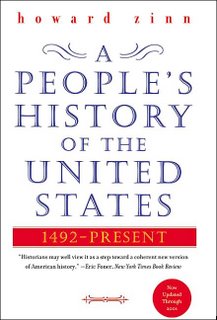The philosopher George Santayana once wrote
"Those who cannot remember the past are condemned to repeat it". Implicit in this statement is that knowledge of history can help us better understand the present and assist us in making good decisions. But as I think of my history education growing up, especially those classes before college, I don't see any aspects of that education which would help me better understand the world today. Let's see, if I become a fascist German dictator I won't attack Russia (at least not in the winter). I also guess I won't settle political arguments with a duel. And if I'm ever a Native American I sure as hell ain't going to trust Whitey. Yes, this information is definitely going to be useful to me.
Traditional history education leaves one completely unprepared as to how to put into context the political situation in the country today. Reading traditional history gives the impression of a country unified with people of common interests. Internal conflict in minimized or ignored altogether, while conflict with foreigners is given emphasis, helping to instill in American youth a sense of deep patriotism and suspicion of others who happened to be born on dirt that fell inside a different countries invisible borders. Today's conflicts in politics, in war, and in economics seem to be unique if traditional history is all we know. Yet there is much in history that sheds a great deal of light onto these subjects and then one can see the truth behind Santayana's statment.
Howard Zinn's book
A People's History of the United States is a great starting point for this. While traditional histories tell history from the point of view of statesmen or from the wealthy, Zinn tells
"America's story from the point of view of-and in the words of-America's women, factory workers, African Americans, Native Americans, working poor, and immigrant laborers". In other words, from the point of view of the average person.

I finished this fairly long book (700 pages) about 30 minutes ago and I really enjoyed it. I also learned a lot. It starts from the landing of Columbus in 1492 and goes up until the invasion of Afghanistan. I was horrified at exactly how unbelievably cruel the Native Americans were treated. This treatment they faced is many orders of magnitude worse than the impression that I had from high school. I also found it interesting to read about all the class conflict between workers and employers and how often and how unified workers were in their strikes, often during times when the rest of the country was suffering from extreme racism. And it angered me each time as the police, national guard, or army would come in on the side of the owners and break up the strikes, many times shooting workers or forcing them to work against their will. I found it extremely interesting to know how widespread socialism and socialist thought was in the United States, especially before the Espionage Act during WWI landed many prominent socialists in jail for free speech "violations" and of course before the McCarthyism of the 1950s made it illegal to not love capitalism. I learned a lot of details about Vietnam that I hadn't heard before and was glad to have a better understanding of this major part of American history.
As I read this book I noticed time and again history repeating itself in ways that are helpful to understand today. From the government lying or omitting important information to bring the country to war to the way that the government sets up "investigations" of itself in order to make the public think that it's reforming after some scandal when in actuality the system isn't changing at all, I saw trends that went throughout history and continue in the most blatant way today. Instead of the usual "Paul Revere liked to ride horsies" historical trivia, the book actually contains the type of lessons that increase one's understanding of today's world.
I highly recommend this book. You can buy it
here
. And also, on an unrelated note, I just finished up a very busy few weeks and so posts should be more frequent. Thanks for your patience!


